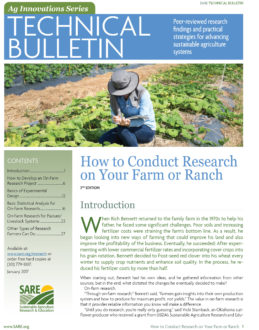Screening Open-Pollinated Vegetable Varieties Bred and Released in North Dakota for Suitability to Organic Production Systems and Local Markets
Organic and direct-market farmers are always looking for the best crop varieties—ones that produce well in their area, are able to withstand pest and disease problems, and give them an edge in the marketplace. Many farmers are also keen on finding open-pollinated varieties, which remain true to type when you save their seed. To fill this need, growers are increasingly looking back in history for older varieties that have those special qualities and characteristics. But, as a farmer, where do you start your search? Seed catalogs can help, but most regionally significant varieties with specific adaptation traits dropped out of the seed trade long ago.
Theresa Podoll of Prairie Road Organic Seed sees this as a tragic and significant loss to gardeners and market growers. She, her husband and extended family have been producing certified organic seed on their 480-acre farm in south-central North Dakota since 1997 and were acutely aware of this need through their business contacts and the various farmer networks they were part of in the region. Knowing that it takes a great deal of time and effort to test and evaluate crop varieties over the course of a growing season, Podoll and two other farmers joined with the Northern Plains Sustainable Agriculture Society and North Dakota State University in 2009 to address this important need.
Research Questions/Objectives
Podoll’s goal for the two-year project was to increase the number of vegetable crop varieties well suited to organic production systems and local markets in North Dakota. Under this goal, she had three objectives:
- Screen a minimum of 60 vegetable varieties for agronomic and quality traits of interest to North Dakota market growers (10 per farm per year).
- Identify at least 12 North Dakota bred, open-pollinated varieties of vegetable crops with agronomic and quality traits of interest.
- Facilitate seed increases of at least nine varieties based on variety trial results and farmers’ market taste tests.
Experimental Design
To identify varieties to include in the screening trials, Podoll gathered information through a survey of the North Dakota Farmers Market and Growers Association, and also consulted archives from North Dakota State University (1926-1991) and varieties bred and selected for the Oscar H. Will and Co. seed catalog (1896-1969). Varieties of interest were researched and seed procured through the Germplasm Resource Information Network system, heirloom seed catalogs and seed-saving organizations, such as Seed Saver’s Exchange, Abundant Life Seed Foundation and Seeds of Diversity Canada. These seeds were included in variety screening trials held in 2010 and 2011.
Each farmer participant conducted vegetable variety screenings of at least 20 varieties: planting, maintaining, monitoring and documenting performance and results using photos and variety evaluation forms. In each of these non-replicated demonstrations, a combination of quantitative (e.g., height, yield or fruit size) and qualitative data (e.g., seedling vigor, color, flavor, disease and pest resistance, and uniformity) was collected.
Traits of interest for each of the crops selected were discussed by the group. Variety trial evaluation sheets were provided by the Organic Seed Alliance. Each of the farmers screened different varieties to gain experience with as many varieties as possible in the two-year project. The farmers gauged their interest in continued production, while noting beneficial and deleterious traits, and any needed improvements to make the crop and variety work for their farm and production system.
Analysis and Results
Seed was saved from 14 varieties; five varieties have undergone continued evaluation, and nine varieties continue to be grown out and selected for variety improvement and seed production. These varieties include Alaska and Homesteader peas, Pinky popcorn, Mantador broccoli, Hidasta Red and Arikara Yellow beans, Sheyenne and Manitoba tomatoes, and Granite State cantaloupes.
“Once you find varieties of interest, implementing sound seed production and maintaining trueness to type may be a challenge,” Podoll said. “Seed saving is an art requiring both knowledge and skills, and is so needed to maintain seed diversity.”
Project Team
Marvin Baker, North Star Farms
Stacy Baldus, Dakota College at Bottineau
Visit the Prairie Road Organic Seed website.
